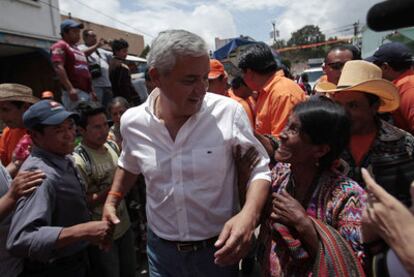Ex-military officer faces runoff race with "populist" in Guatemala
Former first lady watches from the sidelines as three other women run
Guatemala's presidential race is poised to enter a second round after Otto Pérez Molina failed to obtain the necessary 50 percent of the vote in Sunday's elections The runoff between Pérez Molina, a retired general, and Manuel Baldizón, a multimillionaire who is running on a populist ticket, is set for November 6.
There were no surprises in Sunday's elections, except for an unusually high voter turnout, which officials say surpassed 65 percent. Pérez Molina obtained just over 36 percent of the vote while Baldizón, his closest rival, garnered 23 percent.
However, these were no typical elections. For the first time since democracy was restored in 1985 when the country's military dictatorship relinquished power, a ruling party had been forced to watch the race from the sidelines without a candidate. Sandra Torres, the former wife of President Álvaro Colom, was barred from running at the head of her ex-husband's Gana-UNE alliance after Guatemala's courts upheld a constitutional clause that prohibits immediate family members of a sitting Guatemalan president from running for the country's top office.
Torres and Colom had divorced earlier this year - a move the opposition said was a cynical ploy designed to skirt around the country's election laws.
Despite the court rulings against Torres, Sunday's elections did mark the first time that three women were included on the ballot; nevertheless, they received dismal results. One of these candidates was Nobel Peace Prize winner Rigoberta Menchú, who was being supported by a coalition of leftist parties but only captured 3.18 percent of the vote. Patricia de Arzú, wife of Guatemala City Mayor Álvaro Arzú, received 1.8 percent. Worse still, former Interior Minister Adela de Torrebiarte got just 0.41 percent.
One of the key issues in the race is the country's high crime rate, which has been fueled by violence from the spillover of drug cartel activity from Mexico. Guatemala's homicide rate last year was 41 per 100,000. Pérez Molina, of the Patriot Party, has pledged to deal strong blows against drug traffickers and says he is the only candidate capable of pushing out the cartels from his country.
As head of military intelligence in the 1980s, Pérez Molina was instrumental in helping oust rightwing de facto president Efrain Ríos Montt. He also helped force President Jorge Serrano from office in 1993 after the Guatemalan leader had suspended constitutional powers.
Analysts such as Manuel Conde, who set the basis for negotiations with Guatemala's insurgency which ended in the 1996 peace accords, believe that the new political landscape is positive for the country because it will force the two frontrunners to a consensus among other parties. "Only a great pact to support a government of unity will guarantee political viability and democratic government for the country," he said. Nevertheless, Conde pointed out that Pérez Molina has minimal tolerance for any negotiation process and usually leans on his military decisiveness.
On the other hand, other analysts view Baldizón, of the Renewed Democratic Liberty (Líder) party, as an unwise choice. Luis Linares, who is with the independent Association of Investigation and Social Studies, believes the race between a conservative and a candidate "who is too populist" could polarize the country ahead of the second round. Baldizón has made pledges such as extending the death penalty and plans to cut taxes.
If Pérez Molina wins the November round, he would probably seek the support of moderate parties, which would give him a majority to come up with a working program that would promote what Linares calls "democratic accountability."

Tu suscripción se está usando en otro dispositivo
¿Quieres añadir otro usuario a tu suscripción?
Si continúas leyendo en este dispositivo, no se podrá leer en el otro.
FlechaTu suscripción se está usando en otro dispositivo y solo puedes acceder a EL PAÍS desde un dispositivo a la vez.
Si quieres compartir tu cuenta, cambia tu suscripción a la modalidad Premium, así podrás añadir otro usuario. Cada uno accederá con su propia cuenta de email, lo que os permitirá personalizar vuestra experiencia en EL PAÍS.
¿Tienes una suscripción de empresa? Accede aquí para contratar más cuentas.
En el caso de no saber quién está usando tu cuenta, te recomendamos cambiar tu contraseña aquí.
Si decides continuar compartiendo tu cuenta, este mensaje se mostrará en tu dispositivo y en el de la otra persona que está usando tu cuenta de forma indefinida, afectando a tu experiencia de lectura. Puedes consultar aquí los términos y condiciones de la suscripción digital.








































